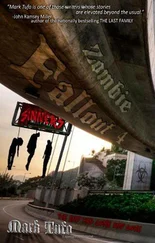“What did she die of?”
“Give you one guess,” she said.
There was silence. Then he talked in general about the amazing advances they’d made in medicine over the years, with the same optimism that marked every conversation of its type, and she could only think how naive he was to think she would be responsive when she had always been immune to that sort of hopefulness. Technology would never advance past primal fear. It would never trump human instinct.
He parked in the hospital parking lot and for a half hour tried to coax her from the car. She wanted him inside the room during the exam, would that be okay? He said it would be. She didn’t want him to leave her side, was that understood? He said he had understood that from the first time she had asked, and the second time, and the third. “Why are you stalling?” he asked. When had Martin become so. . committed? Had she misjudged him from the beginning? Or was this what was required for that commitment to take hold, that she be sent to hell and back? For she was in hell, in that car in the hospital parking lot, and not one cold hand had yet been laid upon her. After three or four attempts to articulate her fear on the ride over she had finally given up, but now she said to him, “I think I can finally explain it,” she said. “It comes down to this. And it’s so simple, Martin, I can’t believe I didn’t think of it before.” “Well,” he said, “so tell me.” “I cannot physically enter that building,” she said. “I cannot get out of this car and enter that building. See that building? I can’t. I won’t.” There was silence. Then he said, “Well, sounds like fear to me.” But he said he still didn’t understand. “What is it fear of, exactly?” he said. “Fear of death? No, you tell me that’s not it. You don’t fear death. Is it that they might tell you something’s wrong? You know something’s wrong. It’s not that either. So what is it? Most people, Lynn, they feel something ain’t right, they get scared. That’s natural. But the next step is getting it fixed. They’re eager to get it fixed. You,” he said, “you have all that reversed. You know something’s wrong — that doesn’t scare you. You go weeks letting it get worse! The idea of getting it fixed? That’s what scares you. Am I right? Isn’t that how it works with you?” That’s why he made partner, she thought. Good insight, good reasoning skills. “Yes,” she said. “I never thought about how fucked up it is until you put it like that, but yes, that’s it.” There was silence. “Do you think there’s a word for that?” she asked. “I could think of a few choice words,” he said. A moment of levity. After that he stared through the windshield, thinking. “Look,” he said, turning to her. “I’ll be right back. You stay here, okay?” “Where are you going?” she asked. “You said you wouldn’t leave me.” “Once we got inside, ” he said. “We’re still in the parking lot.” He reached out and took her hand. “Trust me,” he said. So she let him go and he went inside the building. Ten minutes later he came out again and told her that her appointment had been rescheduled. The wave of relief that came crashing over her quickly receded again into a sea’s depth of despair when he said it was only rescheduled for later that day. “What time?” she asked. “Don’t worry about what time,” he said. “Just put this on.” “What is it?” “What’s it look like?” he asked. “It’s a handkerchief.” “But how am I supposed to ‘put it on’?” He started the car and placed it in reverse. “Like you’re a pirate’s captive,” he said, “and you’ve just been told to walk the plank.”
SHE WALKED INTO THE FIRST BUILDING holding his hand. They took an elevator that made her ears pop. She felt ridiculous because the elevator was full and what the hell was she doing in this blindfold? At one point she heard Martin say, “Stop staring.” “I’m not,” she said. “How could I be?” “I wasn’t talking to you,” he said. After what seemed like an eternity the elevator stopped and everyone got off. He led her by the hand. When he brought her to a halt he undid the blindfold and she knew instantly where she was: on the viewing deck of the John Hancock building, overlooking the city. She was surprised and delighted. “What is it you’re up to, Martin?” she asked, cocking an eye at him. He shrugged innocently and gestured at the view. “I’m showing you the city,” he said. There was the Sears Tower ahead of them and Lake Michigan to the left and to the right the grand and gaudy suburbs. They pointed out where they worked and where they lived and identified the buildings they knew by name. They put money into the viewfinder and looked out at Wrigley Field. They cast their eyes west as far as they would go and they still couldn’t exhaust that endless metropolis. When they were through, Martin put the blindfold back on her. They took the elevator down, walked back to the car, and climbed in again. They drove. Again he parked and led her by the hand. This time they walked up some stairs and she knew there were no stairs in a hospital entrance and so they had to be some other place, and when he held the door open for her and guided her in, she couldn’t see a thing but she could still smell, and she knew right away where they were. She heard a man say, “Two?” “Two,” replied Martin, who made her walk all the way to their table in the blindfold. “All right, take it off,” he said. “I knew it!” she cried out. “I knew just where we were!” They waited twenty minutes for a deep-dish pizza in a back booth under the dim light of Gino’s East, where the black planks above them made them feel as if they were eating under the main deck of a creaky old pirate ship. Those planks had been mercilessly graffitied and dollar bills had been stapled to them. When they stepped out again into the bright shock of daylight, he put the blindfold back on her. She wondered now if her luck had run out.
But they drove what she thought was too short a distance to be back at the hospital and when he took the blindfold off again, she said, “I should have known.” They were at the Jazz Record Mart on East Illinois. “Yes,” he said, full of an irony she loved, “an aficionado like you deserves to be indulged on a day like today.” “Please,” she said, “here’s my credit card, buy what you want — just take your time. ” He spent almost twenty minutes looking through the dusty bins for his obscure recordings. “Not long enough,” she said, when he was through. Then it was back to the blindfold and the car, parking the car and being led by the hand. Stairs again, and not just six or seven of them — three long flights, almost enough to make her winded. She couldn’t believe what he was doing, holding her hand and guiding her along, devising this scheme so uncharacteristic of him, or at least uncharacteristic of that understanding she had arrived at long ago of the living breathing man — a Martin who was without whim or fancy, who drove home only the nail of hard truth, or chose to avoid the issue altogether. What the day had proven more than anything, she thought, was her haste to judge, and the rigidity of those judgments once made. They were inside now — the place had an airy, echoic atmosphere, rumbling low with hushed voices, and footsteps on marble stairs she could pick out one by one. He took the blindfold off and they spent an hour guiding themselves through all the highlights of the Art Institute. “I thought you weren’t an art fan, Martin,” she said. “I’m not a fan of any of the bullshit,” he replied, “but at this level, there are things I enjoy.” “Is that right?” “Sure,” he said. “Point one out to me,” she said skeptically, “when we come upon it, will you?” “This one here, for instance,” he said. “This one?” “Yes, this is a fine piece,” he said. “Care to argue?” They were standing in front of Georges Seurat’s giant Sunday Afternoon on the Island of La Grand Jatte. “No,” she said. She didn’t care to argue.
Читать дальше












